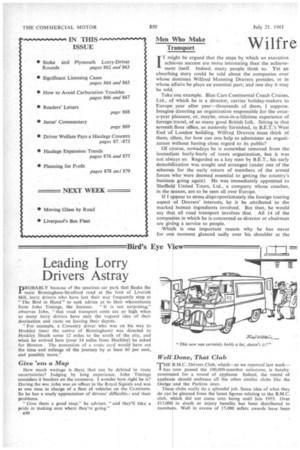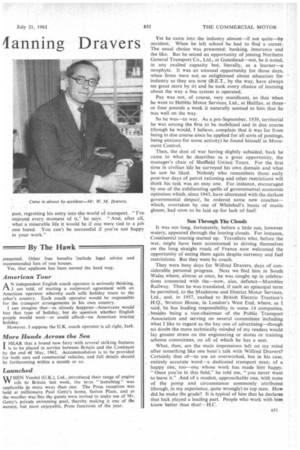Wilfre 'fanning Dravers
Page 34

Page 35

If you've noticed an error in this article please click here to report it so we can fix it.
IT might be argued that the steps by which an executive achieves success are more interesting than the achievement itself. Indeed, many people think so. Yet an absorbing story could be told about the companies over whose destinies Wilfred Manning Dravers presides, or in whose affairs he plays an essential part; and one day it may be told.
Take one example. Blue Cars Continental Coach Cruises, Ltd., of which he is a director, carries holiday-makers to Europe year after year—thousands of them, I suppose. Imagine directing an organization responsible for the oncea-year pleasure, or, maybe, once-in-a-lifetime experience of foreign travel, of so many good British folk. Sitting in that seventh, floor office, so austerely furnished, in B.E.T.'s West End of London building, Wilfred Dravers must think of them, often, for how can one help to administer an organization without having close regard to its public?
Of course, nowadays he is somewhat removed from the immediate hurly-burly of tours organization, but it was not always so. Regarded as a key man by B.E.T., his early demobilization was sought and arranged (under one of the schemes for the early return of members of the armed forces who were deemed essential to getting the country's business going again). He was immediately appointed to Sheffield United Tours, Ltd., a company whose coaches, in the season, are to be seen all over Europe.
If I appear to stress disproportionately the foreign touring aspect of Dravers' interests, let it be attributed to the marked human ingredients involved. But then, he would say that all road transport involves that. All 14 of the companies in which he is concerned as director or chairman are giving a service to people.
Which is one important reason why he has never for one moment glanced sadly over his shoulder at the past, regretting his entry into the world of transport. "I've enjoyed every moment of it," he says. " And, after all, what a miserable life it would be if one were tied to a job one hated. You can't be successful if you're not happy in your work. Yet he came into the industry almost—if not quite—by accident. When he left school he had to find a career. The usual choice was presented: banking, insurance and the like. But he seized an opportunity of joining Northern General Transport Co., Ltd., at Gateshead—not, be it noted, in any exalted capacity but, literally, as a learner—a neophyte. It was an unusual opportunity for those days, when firms were not, so enlightened about education for industry as they are now (B.E.T., by the way, have always set great store by it) and he took every chance of learning about the way a bus system is operated_ Pay was not, of course, very munificent, so that when he went to Hebble Motor Services, Ltd., at Halifax, at three or four pounds a week it naturally seemed to him that he was well on the way.
So he was—to war. As a pre-September, 1939, territorial he was among the first to be mobilized and in due course (though he would, I believe, complain that it was far from being in due course since he applied for all sOrts of postings, being anxious for some activity) he found himself in Movement Control.
Then, the dust of war having slightly subsided, back he came to what he describes as a great opportunity, the manager's chair of Sheffield United Tours. For the first time in civilian life he surveyed his own domain and what he saw he liked. Nobody who remembers those early post-war days of petrol rationing and other restrictions will think his task was an easy one. For instance, encouraged by one of the exhilarating spells of governmental economic optimism which, since 1945, have alternated with the darkest governmental despair, he ordered some new eciacheswhich, overtaken by one of Whitehall's bouts of manic gloom, had soon to be laid up for lack of fuel!
Sun Through The Clouds
It was not long, fortunately, before a little sun, however watery, appeared through the louring clouds. For instance, Continental touring started up. Travellers who, before the war, might have been accustomed to driving themselves on the long straight roads of France now welcomed the opportunity of seeing them again despite currency and fuel restrictions. But they went by coach.
They were busy days for Wilfred Dravers, days of considerable personal progress. Next we find him in South Wales where, almost at once, he was caught up in celebrations connected with the—now, alas, defunct—Mumbles Railway. Then he was translated, if such an episcopal term be permitted, to the Maidstone and District Motor Services, Ltd., and, in 1957, exalted to British Electric Traction's H.Q., Stratton House, in London's West End, where, as I said, he has leading responsibility in some 14 companies, besides being a vice-chairman of the Public Transport Association and serving on several committees including what I like to regard as the key one of advertising—though no doubt the more technically minded of my readers would lay greater stress on the engineering or stores or training scheme committees, on all of which he has a seat.
What, then, are the main impressions left on my mind after something like one hour's talk with Wilfred Dravers? Certainly that of—to use an overworked, but in his case. entirely accurate word—a dedicated transport man; of a happy one, too—one whose work has made him happy. "Once you're in this field," he told me, "you never want to leave it." And of a modest, approachable one, with none of the pomp and circumstance commonly attributed (though, in my experience, quite wrongly) to top men. How did he make the grade? It is typical of him that he declares that luck played a leading part. People who work with him know better than that!—H.C.
























































































































